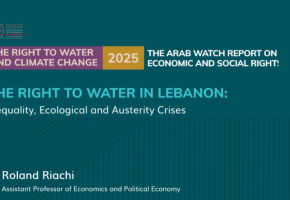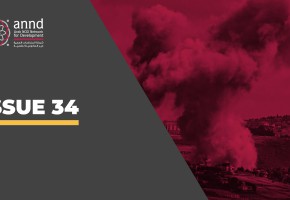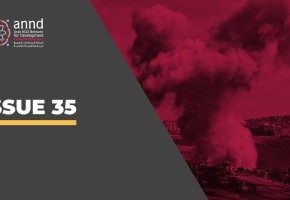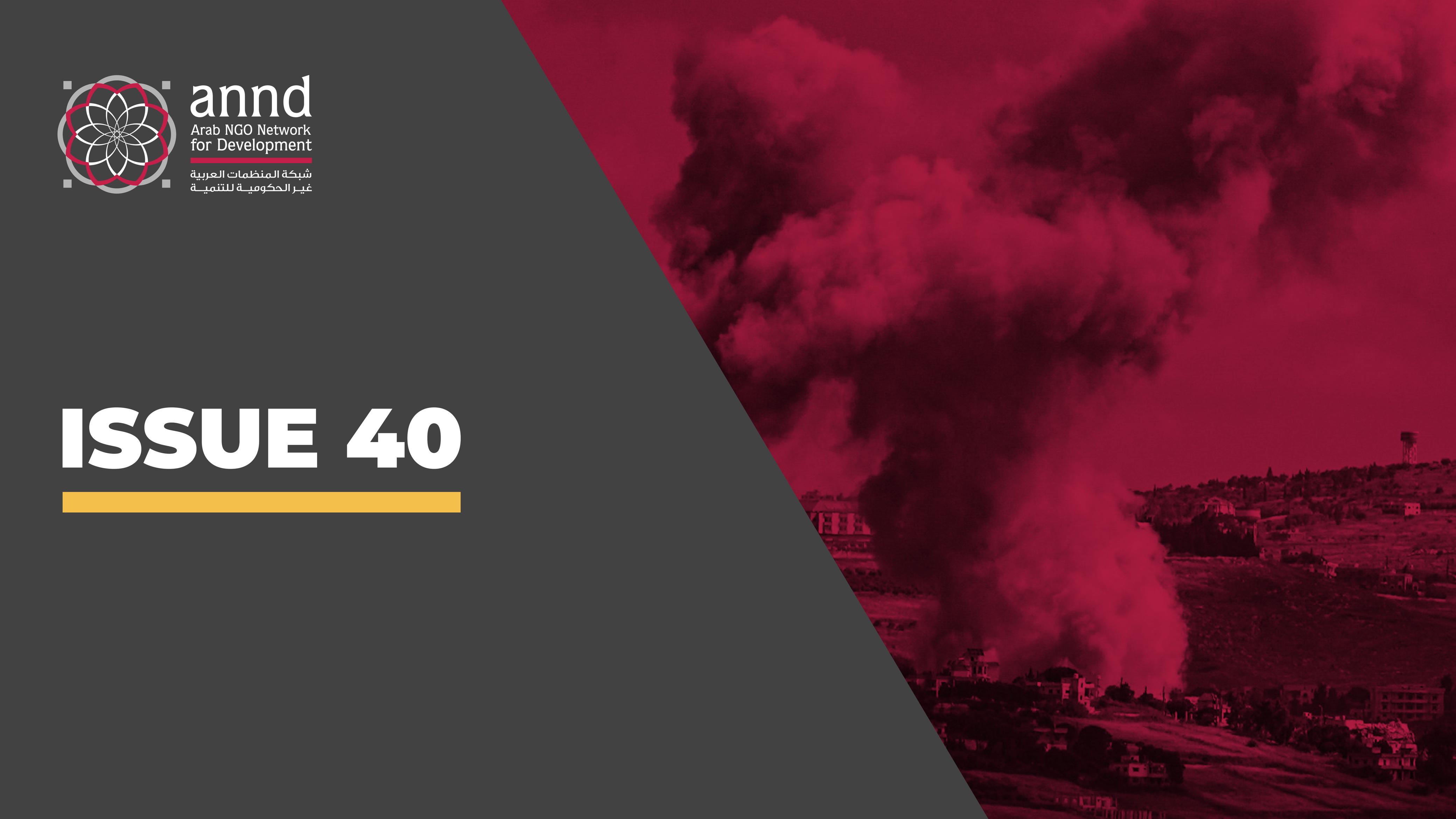
A Region on Fire
Issue 40 - November 5, 2024
Donald Trump returns to the White House, and a government reshuffle strengthens right-wing extremism in Israel: What impact will it have on the war in the region?
ICC Prosecutor Karim Khan joins Special Rapporteur for Palestine Francesca Albanese in saying: "Should I Wait Until Everybody’s Dead?" With this statement, Karim Khan, the Chief Prosecutor of the International Criminal Court, defended his request for an arrest warrant for the Israeli Prime Minister and for action against Israeli officials, emphasizing that they are not above international law.
In a serious political development, Netanyahu dismisses Defense Minister Yoav Gallant, appoints Israel Katz as his replacement. Katz is a far-right politician from the Likud party. He supports extreme policies against the Arab presence in Palestine, is a strong advocate for building settlements, and is firmly opposed to the two-state solution. Netanyahu also appointed Gideon Sa’ar as Foreign Minister, who is from the far-right as well. There are signs he may also dismiss the Chief of Staff and the head of the Shin Bet. The political differences between the Prime Minister and the Defense Minister were deep, but the main conflict was over a planned law formalizing draft exemptions for ultra-Orthodox (Haredi) men. These new appointments signal that the region is heading toward more escalation. Protests erupted in the streets of Tel Aviv in response to the dismissals
Battlefield Developments in Lebanon
Israel launched new airstrikes on several towns in southern Lebanon after a period of relative calm. The intensity of these strikes has lessened, but still affecting dozens of villages and towns in the south. Israeli airstrikes continued throughout Monday on southern towns, while the Beqaa area experienced cautious calm for the first time in over a week.
Night strikes hit the town of Khiyam, and other areas in the south and Beqaa also faced Israeli attacks. A drone strike targeted a car in Talia, east of Baalbek, reportedly killing two people and injuring one. An apartment in Jiyeh, north of Sidon, was also struck, possibly targeting a Hezbollah leader, causing seven injuries and damage to a nearby school, which led the school to evacuate students on their first day of in-person classes. Later, an Israeli drone hit a residential building in Chouf’s coastal area where a Hezbollah financial officer was present, resulting in 25 deaths and numerous injuries.
Reports stated that Israeli soldiers abducted a woman in her seventies from her home in Dahira Fouqa, a border village. The national news agency reported that 37 villages in the south were completely destroyed by the Israeli army, with over 40,000 housing units wiped out within a three-kilometer area stretching from Naqoura to the outskirts of Khiyam.
Israel's military spokesperson, Avichay Adraee, warned southern Lebanon residents that the war is ongoing, urging them not to return to their homes or fields. In response, Hezbollah launched 19 operations targeting Israeli military positions and soldier gatherings. On Tuesday morning, the Israeli army confirmed a soldier was seriously wounded in southern Lebanon during Monday’s battles and reported intercepting missiles launched from Lebanon toward northern Israel. Hezbollah drones have been frequently used to target Israeli military sites and areas, bypassing Israel’s defense systems. Israeli media reported that 80% of attacks toward Israel caused fires, with 220,000 dunams of land burned in the north.
On the ground, Israeli forces have been active along the Maroun al-Ras and Yaroun axes, indicating possible plans to advance toward the city of Bint Jbeil. The Israeli army granted UNIFIL and the Red Cross permission to carry out rescue operations in Khiyam, where there are numerous casualties from nearby battles.
The Ministry of Public Health reported that, over the past 24 hours, 11 people have died and 61 were injured, bringing the total since the start of the conflict to 3,013 deaths and 13,553 injuries.
Political Developments in Lebanon
Prime Minister Najib Mikati received an invitation from Saudi King to attend the Arab-Islamic Summit in Riyadh on November 11.
Former minister Walid Jumblatt stated that plans to displace the Shiite population are still in motion. He added that, following the assassination of Hezbollah's Secretary-General Hassan Nasrallah, Iran has become the main interlocutor, whereas before, President Nabih Berri could maintain stability within certain rules. He stressed the need to differentiate between Hezbollah and the Shiite community, noting that Iran is not the sole authority for the Shiites, with President Berri being a clear example. Jumblatt also commented that U.S. envoy Amos Hochstein has limited influence over Netanyahu and is close to President Joe Biden's children, with ambitions to become Secretary of State if Kamala Harris wins the next U.S. presidential election.
Diplomatic sources indicated that Hochstein's recent mission in the Middle East was successful, suggesting a ceasefire could be reached within a week or two, potentially lasting a while. Hochstein is expected to return to Beirut in ten days, carrying a final proposal to end the conflict between Lebanon and Israel based on U.N. Resolution 1701.
Humanitarian Response in Lebanon
As of now, 1,138 approved shelters have been opened to accommodate displaced people, with 969 of these shelters at full capacity. The total number of registered displaced people in these approved shelters has reached 191,537 individuals (44,986 families), with the highest numbers reported in Mount Lebanon and Beirut, though actual figures are likely higher.
Currently, there are 239 primary healthcare centers, along with 245 mobile clinics and teams. A total of 734 shelters have been visited, and 107,718 displaced citizens have received consultations at primary healthcare centers and mobile units.
Between September 23 and November 5, 2024, General Security recorded the crossing of 366,080 Syrian citizens and 187,544 Lebanese citizens into Syria.
On Tuesday morning, a Russian Ministry of Emergency Situations plane arrived at Beirut International Airport carrying approximately 20 tons of medical supplies. Additionally, a 19th Saudi plane, from the King Salman Humanitarian Aid and Relief Center, also arrived in Beirut with medical aid.
Civil Society Organizations Call for Transparency in Aid Response and a Ceasefire
A group of organizations called on the Lebanese government to fulfill its responsibilities to its citizens, urging Parliament to elect a president and form a rescue government to establish an urgent ceasefire plan and implement relevant international resolutions, particularly Resolution 1701. The statement also called on the executive authority to coordinate and negotiate to ensure the sovereignty of the state, protect Lebanon, and develop a national defense strategy to spare Lebanon further wars and prevent tampering with the sovereignty of the state. The statement appealed to the international community to expedite the issuance of a ceasefire resolution and establish a truce to allow for aid, a political solution, and the implementation of international resolutions.
Transparency International chapter in Lebanon announced that the country has received 1,084 tons of in-kind aid and $682 million in financial grants. The organization called for applying international aid transparency standards in managing these funds and supplies. According to their statement, transparency challenges remain, with 33.9% of aid lacking clear identification of beneficiaries, 43.3% directed to official bodies like the Ministry of Public Health and the Lebanese Army, and 22.8% allocated to NGOs. The statement highlighted the Lebanese government’s ongoing lack of a single public platform to publish details of received aid and its distribution, urging the creation of a clear, public information-sharing mechanism.
International Developments
The deep political differences between the prime minister and the defense minister led Netanyahu to dismiss Galant and appoint Yisrael Katz, a right-wing extremist from the Likud party, in his place. He also appointed Gideon Sa'ar, a far-right extremist, as foreign minister. The immediate reason for the dismissal was the main disagreement over the decision to draft all those of legal age without excluding the Haredim. These appointments mean that the region is heading towards further escalation. Protests were held in the streets of Tel Aviv against the dismissal decision.
Israeli Defense Minister Yoav Gallant stated that the Israeli army is in a "superior position" in Lebanon, giving Israel the right to set its terms. In an interview with the Financial Times, he said, "Our achievements put us in a strong position to demand that Hezbollah push its forces as far north of the Litani River as we wish." He added, "We cannot accept any Iranian military presence in neighboring Syria" and emphasized the need to stop arms transfers from Iran through Syria and Iraq to Hezbollah in Lebanon.
The Yedioth Ahronoth newspaper reported that the Israeli army is withdrawing several brigades from southern Lebanon as efforts toward a settlement advance. However, it noted that the ground operation in southern Lebanon could continue for weeks.
UNIFIL announced that shelling has damaged infrastructure, rendering some roads in southern Lebanon impassable. UNIFIL is working to clear debris and repair roads between villages to restore safe passage.
The US urged Israel to take action against violence by settlers in the occupied West Bank, expressing concern after approximately 20 cars were set on fire in Al-Bireh near Ramallah.
Juliette Touma, UNRWA's communications officer, stated that Israel has no alternative to the agency’s role in Gaza. She warned that halting UNRWA’s activities could lead to the collapse of food and aid delivery for two million people in the region, essential to preventing a humanitarian disaster amid ongoing hostilities. Touma criticized the idea that closing UNRWA would resolve the Palestinian refugee issue as naive, adding that Israelis are misled by a misinformation campaign about the agency.
Egypt condemned Israel’s decision to ban UNRWA activities, calling it an "unacceptable disregard" for the United Nations, its agencies, and the international community.
The World Food Programme (WFP) director in Palestine called for the opening of more crossings in the Gaza Strip to allow aid through.
The Iraqi Prime Minister urged the U.S. Secretary of State to double efforts to end the conflicts in Lebanon and Gaza.
Iran’s Foreign Minister stated that while Iran does not seek tension in the region, it reserves its inherent right to self-defense.
The World Health Organization's representative in the occupied Palestinian territories said that ongoing military operations in northern Gaza are disrupting the organization’s efforts.
Gaza
Northern Gaza is facing widespread destruction and killing of those who refuse to evacuate to the south of the occupied Netzarim corridor. Air, ground, and naval bombardments continue around the clock in central and southern Gaza, targeting displaced persons’ camps and pursuing women and children, aiming to eradicate all sources of life.
The Gaza Ministry of Health reported that the Israeli army committed three massacres against families in the past 24 hours, resulting in 17 deaths and 86 injuries arriving at hospitals. The total death toll from the Israeli assault since October 7, 2023, has risen to 43,391, with 102,347 wounded.
The Palestinian Ministry of Education reported that since the beginning of the assault, 11,808 students have been killed, and 18,596 injured.
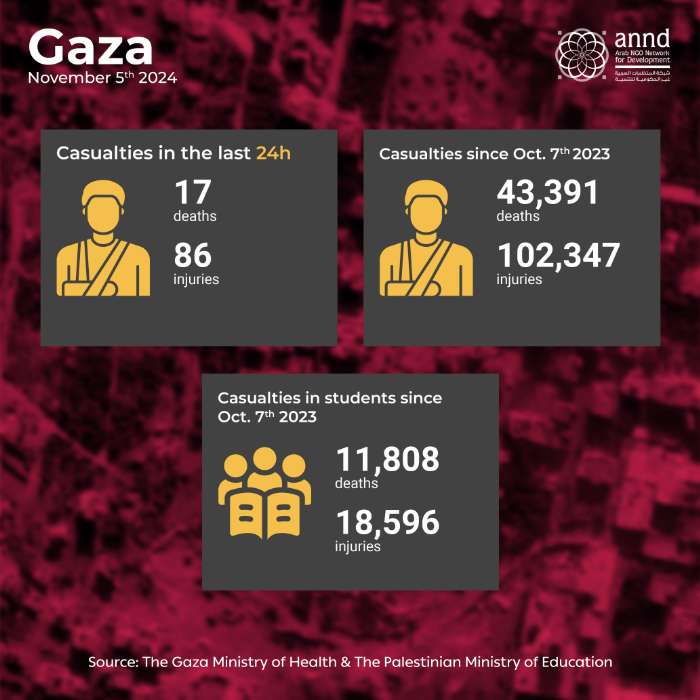
West Bank
Israeli forces raided the villages of Burin and Madama, south of Nablus. Over 20 military vehicles, accompanied by a bulldozer, entered Madama as a group of settlers also moved into the southern area of the village.
Several homes in the village were stormed, with residents detained inside while their homes were searched, and contents were damaged. Threatening leaflets were also distributed to local residents.
Continued Success of Boycott Campaigns
The Carrefour supermarket chain announced the closure of all its branches in Jordan, a move the global BDS (Boycott, Divestment, Sanctions) movement linked to a boycott campaign against Carrefour since the Israeli assault on Gaza due to its support for Israel. Jordanian and international companies have since purchased Carrefour's branches and aimed to retain employees who wished to stay.
As for Starbucks, although only a few branches closed, its sales dropped significantly. Over the past year, alternative Jordanian companies have expanded, attracting former Starbucks employees. Similarly, Jordanian beverage companies have grown to meet market demands, providing alternatives to Coca-Cola and Pepsi and also hiring former employees from these brands.
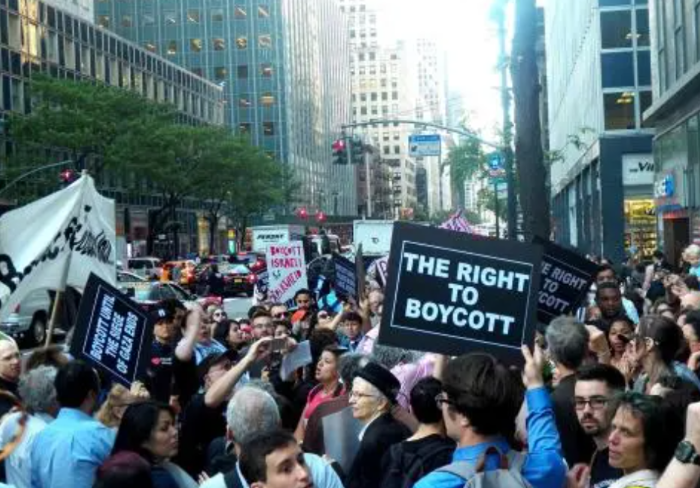
Recent publications
